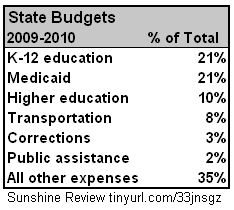
Not if a state owes you money!
Jeb Bush and Newt Gingrich just published an OpEd in the Los Angeles Times arguing that states would be wise to consider filing bankruptcy to relieve their financial troubles. They cite three states, California, Illinois and New York, while failing to mention the angry elephant in the living room with similar problems, Texas.
Texas faces a $25 billion shortfall for a $95 billion two-year budget. That equals California's 18-month deficit inherited by the recently inaugurated Governor Jerry Brown.
"So why haven't we heard more about Texas, one of the most important economy's in America? Well, it's because it doesn't fit the script. It's a pro-business, lean-spending, no-union state. You can't fit it into a nice storyline, so it's ignored," said Business Insider
Texas is a major inconvenience to Bush and Gingrich. They lay the financial problems at the door of unions and state employee pensions:
"The lucrative pay and benefits packages [read pensions] that government employee unions have received from obliging politicians over the years are perhaps the most significant hurdles for many states trying to restore fiscal health." Jeb Bush, Newt Gingrich, January 27
This is blatant intellectual dishonesty. By giving examples of states with strong civil servant unions, they stack the deck for their explanation of state debt. Yet the dire budget problems in Texas negate their argument entirely. That is sufficient reason to dismiss the rest of their arguments and their stated motives, as well.

The Larger Picture - Tear Down that Government at Every Level
In the past few weeks, we have seen a multilevel assault on federal, state and local governments and the programs offered, e.g., public education, roads, public safety, etc.
This year's public fretting over the federal deficit was bipartisan. Peter Peterson's budget commission produced a plan to reduce the federal deficit at the same time that President Obama's hand picked commission reported similar findings. Entitlements, Social Security in particular, require substantial cuts. They failed to note the real causes of the deficit - wars and bailouts.
Even though Social Security has a surplus, there's a repetitive mantra that You'll never get your money out of it. The budget hawks have repeated that so often, they probably believe it. And they should. They're doing everything they can to make sure that we don't see a fair return on our significant investment. The message is clear. Cut Social Security, take less than your were promised, and we'll all live happily ever after (unless you relied on the promise made by the government based on your full participation).
The second assault on government targeted local municipalities - Day of Reckoning 12/19/10. Meredith Whitney of CBS claimed her study showed that the municipal bond market was headed for collapse and chaos (See Economic Populist Dec 20, 2010). Whitney failed to show her work and asked us to trust her. This created unrest in the bond market. Whitney clings to her evidence just the late Senator Joseph McCarthy held tight his fictitious list of 400 Communists in the Truman and Eisenhower administrations who were subverting the government.
Now, Bush and Gingrich are attacking state governments and the programs that they provide to citizens. They focus on unfunded pension liabilities that ballooned during the recession we're told is over. They fail to note the cause of those problems: the fact that pension funds relied on the Wall Street casino and fell victim to the vicissitudes of Goldman Sachs, etc., and the failure of Congress and the last two chief executives to regulate risky behavior.
The Neo Malthusian Catastrophe
Economist Thomas Malthus argued that there would be, "forced return to subsistence-level conditions once population growth had outpaced agricultural production." The new Neo Malhusians argue that we must return to inferior economic conditions, absent the right to organize and bargain for wages and without the promise of Social Security, because expenditures have outpaced the ability to produce offsetting revenue.
Bush and Gingrich fail to ask the questions of real importance. Why has the economy faltered so badly? The answers wouldn't please them or their patrons.
To begin with, there has been no regulation of risk filled financial schemes, from subprime derivatives to credit default swaps, since the big banks and Well Street were set free in the late 1990's.
We're fighting two very expensive and unnecessary wars.
Bailouts!
Then we have the money addiction of the top 1% of the population, which took 65% of the net new income in the United States from 2002 through 2007.
What are they Afraid of?

There is an island of fiscal stability among the states, North Dakota. The traditionally conservative state also has a state bank, the Bank of North Dakota (BND). State funds go into the bank, BND creates credit, and funds are available for the public benefit. Here is the BND statement of purpose for lending.
Lending Services: On behalf of the State of North Dakota, the Bank administers several lending programs that promote agriculture, commerce and industry. Financing economic development is the thrust of Bank of North Dakota’s efforts. The Bank is specifically authorized to assist numerous other financial institutions in providing financing to stimulate economic development in the state.
Ellen Brown has been advocating state banks for the past two years. She points out that, ."With over $17 billion available to deposit in its own bank, California could create $170 billion or more in credit -- enough not only to meet its budget shortfall but to fund many other much-needed projects; and rather than feeding an ungrateful Wall Street, the bank's profits would return to the state and its people." Ellen Brown, July 22, 2009
Legislation was introduced in Washington that would create a state bank of Washington. This has attracted attention since it would be only the second state bank if the legislation passes.
"Rep. Bob Hasegawa, D-Seattle, the House bill’s sponsor, said the proposal was modeled after a similar institution in North Dakota and based on the idea that the state’s money should not be at the disposal of Bank of America, where Washington has its accounts.
“Why don’t we create our own institution, keep that money in our state and we make money off our money that we can then reinvest back into our community?” asked Hasegawa.' The News Tribune, January 26
Aside from their general paranoia and guilt, the potential of a state bank movement may have Jeb Bush, Gingrich, and their patrons frightened out of their wits. They may be particularly fearful of the unpredictable and innovative Governor Brown who needs financial relief now and has the will and spirit to engage in a political showdown. BND is a highly credible state project. A Washington State bank would be significant due to the size of the state and the major business located there..
But a Bank of the State of California would represent a major threat to just about everyone on of the Neo Malthusians. The state was and can be once again a trend-setter. What a trend that would be.
END
This article may be reproduced in part or in its entirety with attribution of authorship and a link to this article.

Comments
Parts Produce Collective Chaos
The financial crisis on the state level, as well as on the federal level, can best be understood by examining each individual part, that collectively, combine to produce the economic chaos being felt and reported all across this nation. What we're seeing is the proverbial "domino effect", where "A" influences "B", which in turn, causes "C". On the state level, we have fat unmerited and unwarranted pensions for state workers. As reported a short while back, some police officers in California receive over $100k a year in retirement pay. Also in California, its been reported for years that illegal immigrants receiving benefits from social programs, such as medical care, food stamps, housing and education, are a huge cost to state revenue funds. And, as it is with the federal government, years of "run-away spending" and "no-bid government contracts", have finally taken their toll. The big picture is comprised of many pieces, and each piece has contributed to the financial and socioeconomic crisis across this nation.
When you have more money going out than coming in, you have to borrow money to meet your obligations. This borrowed money ( debt ) soon becomes the proverbial snowball rolling down the mountain, getting bigger and bigger as it rolls. Lost and declining tax revenue, deficit spending, and growing demand for state and federal funded services and programs, collectively will produce a financial train wreck.
The unemployment situation has contributed much to the financial misery of both the state governments and the federal government. High unemployment results in less tax revenue through payroll deductions, less sales taxes, more demand on state provided assistance programs, more demand on assistance programs provided by the federal government, and less spendable income in the pockets of consumers to support retail.
Another piece of the big picture is the huge drop in property taxes. Property devaluation has resulted in less tax revenue for local and state coffers. Many previous homeowners are now renters, and renters don't pay property taxes.
In addition, tax revenue is lost through corporate tax breaks, job out-sourcing, unemployment benefits, assistance programs, tax loop-holes, tax cuts, and unrealistic pension gaurantees. In short, the "debt buzzards" have finally come home to roost.
Bankruptcy is not the answer, nor is it a cure. There're no signs or indications that the financial crisis is a temporary problem, or one that can be rectified in the near future. Even after possible bankruptcies, the problems will remain, as will the shortage of tax revenue. Besides, bankruptcy doesn't cure irrresponsible spending, habitual waste, and a system founded on debt based operation.
As long as we have a "dependent economy", these problems and conditions will remain, and realistically, get much worse. We do not have a self-supporting economy, sufficient enough to meet the financial challenges facing state governments, the federal government, and Main Street America.
Because you can do wrong, and get away with it, doesn't make it right
Doesn't make it right!
That's the argument the Bush-Gingrich crowd used against strategic defaults and successful challenges of fraudulently conceived and executed mortgage contracts. But when it comes to screwing the state employees and the citizens out of services, they're OK with default.
I do think that there is at least an awareness of the collective effects of chaos by the perpetrators. They're living off of their vapor value stocks and watching the people suffer. Not a pleasant seen and not tolerable for long. Very good point on your part.
The people of Tunisia and Egypt have had enough. Conditions were so bad in Tunisia, people chose self-immolation as a way out. There was no religious underpinnings of that revolution and Egypt's is free of that, it appears.
It's time to say enough, no more. Fix it or get out of the way and let us fix it. How many times do we need to see a politician talk about how productive the American worker is? It's become both trite and revolting, at the same time. The element of the society that isn't productive is the faction in control. They failed miserably. So, I'm sure they're expecting a promotion.
Michael Collins
What Sleaze
The only reason that these states have financial problems is that the rich and corporations don't pay anywhere near their share in taxes.
Texas
They have no state income tax and otherwise low taxes. That puts them in a drastically different position than California don't you think?
Oh and $25 billion over 2 years versus $25 billion over 18 months is NOT the same quite obviously.
Good points
I think Texas is in much worse shape. They can't raise state income tax, as you point out. They have none. What do they do when they're backed up against the wall? The Texas deficit is $12 bil a year and the California number annualizes to about $16 bil. California's budget is twice that of Texas.
Texas Gov. Rick Perry is running for the Republican presidential nomination. He's doing everything he can to keep the Texas fiasco under wraps. This won't end well.
Michael Collins
Different Situations
Texas - having no income tax, could institute one at a relatively low rate and solve their issue whereas California is already taxed to the hilt and can't raise taxes easily. They will raise them though and raise them and raise them.
Will Texas institute an income tax to take care of their deficit? That's the business of residents there don't you think? They'll probably push even lower costs. This is exactly why we have a state system so different people can enact different state hoods. Otherwise we'd just be one big government - we're not.
According to the National Council of State Legislatures the Texas projected 2012 deficit is $7.4 - 17% of it's budget while California's is $19.2 billion or 18.7% of their budget. That's from an LA Times article that was fairly critical of Texas.
We should also be reminded that California used IOU's to pay vendors for a few months last year when they ran out of money. That didn't happen in Texas did it or anywhere else for that matter in the US - not at a state level. Texas though does seem to neglect some base rights such as education etc. These are big trade offs and really another conversation.
So if you were sending your children to public schools and had job offers in all 50 states - all other things being equal would you or I pick Texas? I doubt it.
Regardless neither state has 'better' policies just policies that have come about due to the make up of the voting classes there.
My state has plenty of its own issues so I'm not one to degrade another state's makeup.
One thing I believe we can absolutely agree on is there has been a luke warm recovery at best and imo not even that.